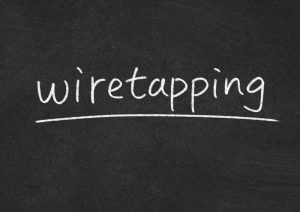Wiretapping is a complex and sensitive area of the law that requires an in-depth review of the relevant statutes and an awareness  of your rights. At the Powers Law Firm, we understand the importance of your privacy in wiretapping cases and are committed to ensuring that our clients receive legal advice they can trust.
of your rights. At the Powers Law Firm, we understand the importance of your privacy in wiretapping cases and are committed to ensuring that our clients receive legal advice they can trust.
This guide provides an overview of wiretapping laws, their implications in North Carolina, and how they may impact your case.
What is Wiretapping?
Wiretapping involves the interception of electronic communications, such as phone calls, text messages, and emails, without the consent of at least one party involved in the communication.
It is regularly used in criminal investigations, but can also be something done by individuals such as private investigators, spouses, boyfriends, girlfriends, family members, and businesses.
Wiretapping laws govern the circumstances under which these interceptions are legal and the possible remedies available to those who have been wronged by illegal activity.
Federal Wiretapping Laws: The Electronic Communications Privacy Act (ECPA)
The Electronic Communications Privacy Act (ECPA) is the primary federal statute regulating wiretapping in the United States. The ECPA comprises three main parts:
- Title I: Wiretap Act – Governs the interception of oral, wire, and electronic communications during transmission.
- Title II: Stored Communications Act (SCA) – Regulates access to stored electronic communications and records.
- Title III: Pen Register and Trap and Trace Statute – Addresses the use of pen registers and trap and trace devices.
The ECPA establishes the legal framework for wiretapping and sets the standards for law enforcement to obtain a court order to intercept communications.
State Wiretapping Laws: North Carolina and South Carolina 
In addition to federal laws, wiretapping is also governed by state laws. Both North Carolina and South Carolina have specific statutes regulating wiretapping:
- North Carolina General Statutes § 15A-287: Prohibits the interception of wire, oral, or electronic communications without the consent of at least one party to the communication.
- South Carolina Code § 17-30-10 et seq.: In South Carolina it is a criminal offense to use a recording device to share or record oral, wire, or electronic communications without the consent of at least one participant.
It is essential to consult with an experienced attorney to understand the nuances of these state laws and how they may apply to your case.
Legal vs. Illegal Wiretapping
There are specific situations in which wiretapping is considered legal. For example, law enforcement may intercept communications with a valid court order, or individuals may be able to record their conversations. However, intercepting communications without the necessary consent or authorization is generally illegal and can be a serious criminal charge.
Obtaining a Court Order for Wiretapping
Wiretapping involves recording communications between parties, commonly without their knowledge or consent. While wiretaps can be a powerful tool for law enforcement conducting criminal investigations, they also interfere with the right to privacy and 4th Amendment protections against unreasonable search and seizure.
Law enforcement agencies may be able to obtain a court order to intercept communications if they can establish probable cause that the interception will provide evidence of a crime. The application for a court order is a type of search warrant.
What are trapping devices?
Trap and trace devices are a form of wiretapping that enable law enforcement to obtain information about the origin of incoming communications. The trap-and-trace device records the telephone numbers of incoming calls, while a pen register records the numbers dialed from a particular phone line. They, too, carry 4th Amendment search and seizure implications. As such, call detail records should be obtained through a search warrant, court order, or with proper consent.
If you are being investigated for a crime or suspect your conversations are being illegally intercepted, it is important to seek legal advice as soon as possible. An experienced attorney can help you understand the relevant laws and how they may impact your case. They will also be able to advise you on the best steps to take to ensure that your rights are protected.
Remedies for Unlawful Wiretapping 
If you believe that your communications have been intercepted illegally, you may have recourse under both federal and state laws. Potential remedies include:
- Suppression of evidence: If law enforcement obtains evidence through illegal wiretapping, that evidence could be suppressed and deemed inadmissible in court. This can significantly impact the outcome of your case, as it may weaken the prosecution’s case against you.
- Civil lawsuits: Victims of illegal wiretapping can file a civil lawsuit against the responsible party. If successful, you may be entitled to damages, including compensation for any actual harm suffered, punitive damages, and attorney’s fees.
- Criminal charges: In some cases, individuals who engage in illegal wiretapping may face criminal charges. Penalties for these offenses can include fines and imprisonment.
Protecting Your Privacy and Rights in a Wiretapping Case
If you suspect that you are a victim of illegal wiretapping or are facing charges related to wiretapping, it is crucial to seek experienced legal representation. At the Powers Law Firm, we are dedicated to protecting your rights and privacy. Our team of criminal and civil attorneys would like to help you navigate the complexities of wiretapping laws and develop a strategy tailored to your unique situation.
Steps to Take if You Suspect Illegal Wiretapping
- Preserve evidence: If you have any evidence of illegal wiretapping, such as suspicious recordings or electronic devices, ensure that you keep them safe and secure. This evidence may be crucial in proving your case or defending against charges.
- Consult with an attorney: Speak with a knowledgeable attorney with experience handling wiretapping cases. They can help you understand your rights and legal options, as well as advise you on the appropriate course of action.
- Limit your communication: If you suspect that your communications are being monitored, be cautious about the information you share over the phone, in emails, or through other electronic means.
- Report the violation: After speaking with legal counsel and if advised to do so, it may be appropriate to contact the appropriate law enforcement agency to report the illegal wiretapping. They may be able to investigate the matter and pursue criminal charges against the responsible party. Put simply, ask for legal advice from an experienced attorney before you do anything.
At the Powers Law Firm, we understand how intimidating and frightening it can be when your conversations are monitored without your consent or knowledge. Our goal is to protect your rights and privacy in a wiretapping case. Contact us today to discuss your case and explore available options.
Is Wiretapping Stalking? 
Most people think of wiretapping as something law enforcement does to track suspects and gather incriminating evidence. Wiretaps can also be something that domestic abusers and stalkers misuse to listen in on and record private telephone conversations. Stalking is generally defined as engaging in a course of conduct directed at another person with the intent to cause fear or harm. Wiretapping does not necessarily involve a physical threat. However, it can be used for abusive purposes.
What is Cyberstalking in North Carolina?
Cyberstalking is a form of online harassment that uses various forms of digital technology to stalk, threaten, or harass another person. The most common types of cyberstalking include threats and intimidation via direct messaging and social media platforms, as well as tracking an individual’s online activities without their consent. Cyberstalking is considered a crime in the state of North Carolina and may be punishable by fines or imprisonment.
Preventive Measures Against Wiretapping
While it is essential to know your rights and seek legal representation when faced with wiretapping issues, it is equally important to take preventive measures to protect your privacy. Here are some steps you can take to minimize the risk of wiretapping:
Secure Your Devices and Communications
- Update your software: Regularly update your devices’ software, including your operating system, antivirus, and anti-malware programs. This helps protect against vulnerabilities that hackers may exploit to intercept your communications.
- Use strong passwords: Create strong, unique passwords for all your devices and accounts. Avoid using easily guessable information, such as names or birthdays, and consider using a password manager to help you manage your passwords securely.
- Enable encryption: Use end-to-end encryption for your communications, such as messaging apps and email. This ensures that only the intended recipients can access the content of your messages.
- Be cautious with public Wi-Fi: Public Wi-Fi networks can be vulnerable to eavesdropping. Avoid using them for sensitive communications or consider using a Virtual Private Network (VPN) to protect your data.
Monitor Your Environment
- Inspect your surroundings: Regularly check your home and office for suspicious devices or signs of tampering, such as unusual wires, small holes in walls, or displaced objects.
- Be aware of social media and emails: Be cautious when sharing personal information, especially with unfamiliar individuals. Social engineering tactics, such as phishing emails or phone scams, can be used to gather information that may facilitate wiretapping.
- Control access to your devices: Keep your devices secure and limit access to them. Do not leave them unattended in public places and be cautious when lending them to others.
How the Powers Law Firm Can Help 
At the Powers Law Firm, we understand the importance of protecting your privacy and rights in the face of wiretapping concerns. Our team of dedicated attorneys is committed to providing you with the guidance and representation you need. Our services include:
- Legal advice: We offer comprehensive consultations to help you understand your rights and legal options in wiretapping cases.
- Case evaluation: Our team thoroughly reviews the facts and circumstances of your case, identifying potential defenses and strategies to protect your rights.
- Representation in court: We represent clients in both criminal and civil proceedings related to wiretapping, including suppression hearings and lawsuits for damages.
- Negotiations and settlements: Our attorneys are experienced negotiators.
If you are facing a wiretapping-related issue or believe that your communications have been intercepted illegally, do not hesitate to reach out to the Powers Law Firm. Our experienced team is ready to help you navigate the complexities of wiretapping laws and defend your rights and privacy.
Conclusion
Wiretapping laws are complex and nuanced, with significant implications for your rights and privacy. If you are facing a wiretapping-related issue or believe that your communications have been intercepted illegally, it is essential to seek the guidance of an experienced legal team. At the Powers Law Firm, we are committed to providing our clients with dedicated and compassionate legal representation in wiretapping cases. Contact us today to discuss your situation and learn more about how we can help protect your rights and interests.
Additional Information and Helpful Resources
- Need legal help involving Family Law or Divorce?
- How the Police Conduct a Criminal Investigation Before Arrest
- Charged with a crime of domestic violence?
- Considering Divorce? Here’s Where to Start
- What are the Top 3 Things to do if Arrested
- What Does Indictment Mean?
- Why hiring a divorce attorney is so important
- Is Alienation of Affection still a thing in North Carolina?
- What is Probable Cause in North Carolina?
Wiretapping laws involve more than just telephone calls and one-party consent. It may be illegal and run afoul of call recording laws to secretly record screen captures, video feeds, social media messages, and texts. It’s a good idea to consult with a criminal defense lawyer if you’ve been accused of cyberstalking, interference with emergency communications, or acts of domestic violence.
 Carolina Criminal Defense & DUI Lawyer Updates
Carolina Criminal Defense & DUI Lawyer Updates

